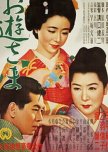"I never realized how heavy this kimono was"
Love triangles can be problematic, especially when communication isn’t encouraged and everyone is guided by rigid social principles. Two loving sisters ended up in a trap of their own making when society denied them the freedom to make their own choices in Miss Oyu.
Shinnosuke has resisted every marital prospect until Shizu’s entourage approaches his house and he falls in love at first sight. The only problem---the woman he fell in love with was Shizu’s older widowed sister, Oyu. Known for her beauty and elegance, Oyu was tied to her late husband’s family and couldn’t leave because she had given birth to the heir. Oyu pushes for Shizu to marry Shinnosuke because she wants to stay near her sister. Before long the three are inseparable. Unknown to Oyu, Shizu announced on her wedding night to her husband that she intended to be married in name only because she knew he loved her sister and her sister loved him. This sisterly sacrifice led to more heartache for all involved, primarily for the sisters.
Director Mizoguchi and cinematographer Miyagawa created a treat for the eyes in black and white. The scenery, sets, and costumes were luxurious. Similar to Kurosawa, he framed his scenes with action in the foreground and background, giving the scenes visual depth and interest. The traditional music haunted the film with melancholy as the characters dealt with their repressed emotions.
Tanaka Kinuyo and Otowa Nobuko were the heart of the film, conveying sisters deeply committed to each. Hori Yuji looked like he just came along for the ride. His immature and passive Shinnosuke barely registered on the screen when the two women were around. Was Oyu truly, passionately, in love with Shinnosuke? As far as the story went, it was difficult to determine what Oyu’s feelings truly were. She kept them neatly tucked. Was she in love? Flattered? Or oblivious to Shinnosuke’s love? When scandal threatened, she set the married couple straight in what their obligations to each other were. What drove Shizu’s need to sacrifice her own happiness and future? What debt could she possibly owe her sister? The writers weren’t telling and the actors weren’t giving many clues either as to why the trio was willing to dance on the edge of a knife where any mistake would lead to devastating scandals and familial reprisals.
Miss Oyu was visually interesting, the three people tragically caught up in a silent triangle of repressed feelings not so much. Tanaka and Otowa did their best to infuse intensity into the story but were confined by the writers and the film's societal norms.
30 January 2024
Shinnosuke has resisted every marital prospect until Shizu’s entourage approaches his house and he falls in love at first sight. The only problem---the woman he fell in love with was Shizu’s older widowed sister, Oyu. Known for her beauty and elegance, Oyu was tied to her late husband’s family and couldn’t leave because she had given birth to the heir. Oyu pushes for Shizu to marry Shinnosuke because she wants to stay near her sister. Before long the three are inseparable. Unknown to Oyu, Shizu announced on her wedding night to her husband that she intended to be married in name only because she knew he loved her sister and her sister loved him. This sisterly sacrifice led to more heartache for all involved, primarily for the sisters.
Director Mizoguchi and cinematographer Miyagawa created a treat for the eyes in black and white. The scenery, sets, and costumes were luxurious. Similar to Kurosawa, he framed his scenes with action in the foreground and background, giving the scenes visual depth and interest. The traditional music haunted the film with melancholy as the characters dealt with their repressed emotions.
Tanaka Kinuyo and Otowa Nobuko were the heart of the film, conveying sisters deeply committed to each. Hori Yuji looked like he just came along for the ride. His immature and passive Shinnosuke barely registered on the screen when the two women were around. Was Oyu truly, passionately, in love with Shinnosuke? As far as the story went, it was difficult to determine what Oyu’s feelings truly were. She kept them neatly tucked. Was she in love? Flattered? Or oblivious to Shinnosuke’s love? When scandal threatened, she set the married couple straight in what their obligations to each other were. What drove Shizu’s need to sacrifice her own happiness and future? What debt could she possibly owe her sister? The writers weren’t telling and the actors weren’t giving many clues either as to why the trio was willing to dance on the edge of a knife where any mistake would lead to devastating scandals and familial reprisals.
Miss Oyu was visually interesting, the three people tragically caught up in a silent triangle of repressed feelings not so much. Tanaka and Otowa did their best to infuse intensity into the story but were confined by the writers and the film's societal norms.
30 January 2024
Cet avis était-il utile?

 55
55 210
210 11
11























